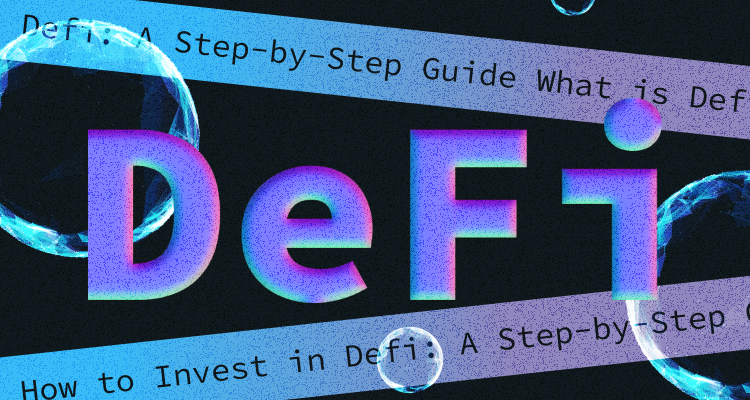You probably heard of DeFi many times. But what exactly is DeFi in cryptocurrency? This article talks about such things as DeFi, TredFi, and other related stuff.
Before we start, let's first look at our standard financial system. Imagine you want to buy a new phone or a car. Probably, you need to go to a bank to take out a loan, right? The bank, in this case, is an intermediary between you and your desired thing. The bank will regulate the transactions and ensure everything is secure at all process stages. The bank should trust you first of all to give you the loan. You, in turn, have to charge your bank. So, the traditional financial market is always about intermediaries, such as banks or stock exchanges.
DeFi (pronounced dee-fye) got rid of those intermediaries and replaced them with software. You don't need a bank or a stock exchange anymore. Instead, you can directly address other people and buy what you need directly from them.
"Wait, wait, wait, what about the safety?" - you would ask then. Great question!
In decentralized finance (DeFi), security is guaranteed by blockchain-based "smart contracts." They make markets, settle trades, and ensure the entire process is fair and trustworthy. So, decentralized finance in crypto is a new and probably better version of our financial system.
Now let's look a bit closer at how DeFi works.
How Does DeFi Work?
One crucial feature of DeFi is that it works because of the code and smart contracts. As mentioned above, you would need an intermediary to satisfy your needs in the traditional financial system. Wanna have a share in a prosperous company? You must address the stock exchange and pay the commission for their services. Need to buy something? You need to use a bank card, and the bank takes some commission for these transactions. And no one guarantees you get your loan because your bank may reject you based on your credit history.
In the DeFi crypto world, you no longer need an intermediary as the whole system is based on blockchain technology, typically Ethereum. DeFi's smart constructs allow you to borrow or lend cryptocurrency; every transaction is written in the code. DeFi also includes lending platforms, prediction markets, options, and derivatives.
DeFi is often called a new financial market, mainly decentralized, and deals exclusively in crypto, with crypto versions of many products. With DeFi, you buy the products and pay for the services you need without any red tape and regulations from the traditional financial system. And you hold your money in a secure digital wallet instead of keeping it in a bank. Plus, DeFi works pretty fast. All transactions with a cryptocurrency are done within seconds or minutes. Is it safe, you ask me?
On the blockchain, transactions are recorded in blocks and then verified by other users. The block is closed and encrypted if these verifiers agree on a transaction. Then another block is created with information about the previous block. These blocks are linked or "chained" with all the information. The information in previous blocks cannot be changed without changes in the following blocks, so there is no way for fraud. That is what makes blockchain technology so secure.
A little fly in the ointment is that DeFi is still relatively young, so its regulations are still under development and debate. Just remember that.
DeFi Financial Products
Now that we know what DeFi stands for and how it works with cryptocurrency let's see what financial products of DeFi you can use.
Peer-to-peer (P2P) transactions
P2P transactions are the most popular type of DeFi product. It is when one party agrees to exchange cryptocurrency for goods or services without intermediaries. You still have to pay a fee for this transaction, but now you are not framed by borders or distance. Your lender can be anywhere in the world.
All you need is a decentralized finance application (dApp) to enter your loan needs, and an algorithm will match you up with other users that meet your needs. You'd then need to agree to one of the lender's terms and receive your loan.
DeFi Currency
DeFi uses cryptocurrency for transactions, precisely stablecoins. Stablecoins are cryptocurrencies whose value is pegged to the value of a government-backed currency, such as the U.S. dollar. Stablecoins are crucial for the DeFi system, and I will tell you why.
If you're a crypto investor, you avoid constantly changing tokens back and forth to dollars or keep all your assets in cryptocurrencies, whose values might jump and fall daily. You want a crypto coin that behaves like a stable dollar, whose price keeps at the same level. The technology of DeFi is still developing, so it is difficult to determine precisely how existing cryptocurrencies will be implemented, if at all.
How do I make money with DeFi?
Now let's talk about the profit that you can get from DeFi. There are several options for earning passive income, such as yield farming, staking, and lending.
Method 1. Yield Farming
Using existing crypto assets, yield farming, or liquidity mining in DeFi earns more cryptocurrencies. Yield farming requires investors to stake or delegate crypto assets to a smart contract-based liquidity pool. The pool then reuses the invested cryptocurrencies to provide liquidity in DeFi protocols and distributes some of the procured fees to the user as rewards. Something like a deposit in a bank.
DeFi yield farms support using ERC-20 tokens such as Ether for investments and rewards. It is programmed to earn the highest yield or return possible and tends to be one of the riskier investments in DeFi-based passive income.
So, to avoid being deceived, select established and trustworthy platforms with a positive reputation and whose smart contracts have been externally audited.
Method 2. Lending
Landing includes lots of investment strategies for passive incomes with cryptocurrencies. The landing system in DeFi looks like the process of getting a bank loan, but again without an intermediary. Likewise, DeFi lending investors can interact directly with borrowers through pre-approved smart contracts. In other words, DeFi lending platforms allow investors to enlist their crypto tokens, which can be loaned by borrowers and repaid within a period of interest.
Lending platforms also pay users an APY for locking their assets into a smart contract. Compound Finance, for example, currently offers an APY of 8.19% for lending DAI.
Method 3. Become a liquidity provider
One more way of earning crypto passive income. Decentralized exchanges such as Uniswap and SushiSwap support swaps between token pairs, like ETH and USDT. This liquidity comes from pooled tokens belonging to liquidity providers (LPs) or ordinary DeFi users who place their tokens into the smart contract controlling the pool. The more trades you conduct via that pool, the more you earn. If so, you can make a 0.3% fee from all swaps, proportionally to your pool share, on Uniswap's DEX.
First, analyze data from LP aggregators that pull real-time data to make your profit bigger. That will help you estimate potential returns from various pools.
Method 4. Staking
The token is usually the native asset of the blockchain, such as ETH, in the case of Ethereum. DeFi staking is quite close to yield farming, with some differences, though. Like yield farming, users need to deputize or lock up their crypto holdings to become validators on the blockchain.
If you stake cryptocurrency, you can earn rewards by locking up your tokens for a fixed amount of time, depending on the plans offered by the operator. Every blockchain will require a minimum amount of tokens before it can add a user as a validator.
I want to mention that cheating makes no sense from an economic perspective on blockchains. Stakers are incentivized to lock up their assets for an extended period and earn rewards for contributing to the network's security and decentralization.
This staking process is automated, so you don't need to check it every minute. After you deposit your funds into the smart contract, you can leave the Proof-of-Stake mechanism to take care of the rest and periodically claim your rewards.
DeFi vs. CeFi: A Comparative Analysis
When discussing DeFi, it's helpful to compare it directly with Centralized Finance (CeFi) to understand the fundamental differences and potential advantages of each approach.
User Experience
CeFi: Offers polished, user-friendly interfaces with customer support and recovery options for lost passwords or funds.
DeFi: Currently has steeper learning curves but is rapidly improving. Requires users to take responsibility for their private keys and security.
Financial Inclusion
CeFi: Requires identity verification, credit checks, and often excludes individuals without banking history or from certain regions.
DeFi: Accessible to anyone with an internet connection and a compatible device, regardless of location, wealth, or status.
Innovation Speed
CeFi: Changes slowly due to regulatory requirements and institutional bureaucracy.
DeFi: Evolves rapidly through open-source development and composability (protocols building on top of each other).
Cost Structure
CeFi: Often includes account fees, transfer fees, and various hidden costs.
DeFi: Typically has transparent gas fees for blockchain transactions and platform fees for services.
Trust Model
CeFi: Requires trusting institutions with your funds and personal data.
DeFi: Replaces institutional trust with cryptographic verification and code transparency.
This comparison highlights why many see DeFi as not just an alternative to traditional finance but as a transformative approach that could address many longstanding issues in the global financial system.
The Future of DeFi
DeFi is still a new and developing system. Like any new system, it has its pitfalls. The biggest question that arises right now is regulations. Whereas the traditional financial system is regulated by countries and institutions, who will regulate DeFi? What if fraud or scam happens? Who is going to investigate it? Who would enforce the regulations, and how would they enforce them?
Other uncertainties concern system stability, energy requirements, carbon footprint, system upgrades, system maintenance, and hardware failures.
Many people like DeFi because it's so new and unregulated. But, DeFi is a tool to eliminate all tedious regulations and make life better and more accessible. And as a rapidly growing market, DeFi attracts more and more investors and their money. They see opportunities to build something new and exciting in the crypto world, earn heaps of money, or earn some passive income. Plus, if you're a clever trader or an experienced financial engineer, you can experiment and do everything you want without the rigid frames of the traditional financial system. So these people see opportunities in DeFi rather than risk.
To learn more about DeFi and how it works, you can through watching these great educational videos:
- DeFi For Beginners
- What is DeFi? A Beginner’s Guide to Decentralized Finance
- What is DeFi? | Decentralised Finance Tutorial For Beginners

